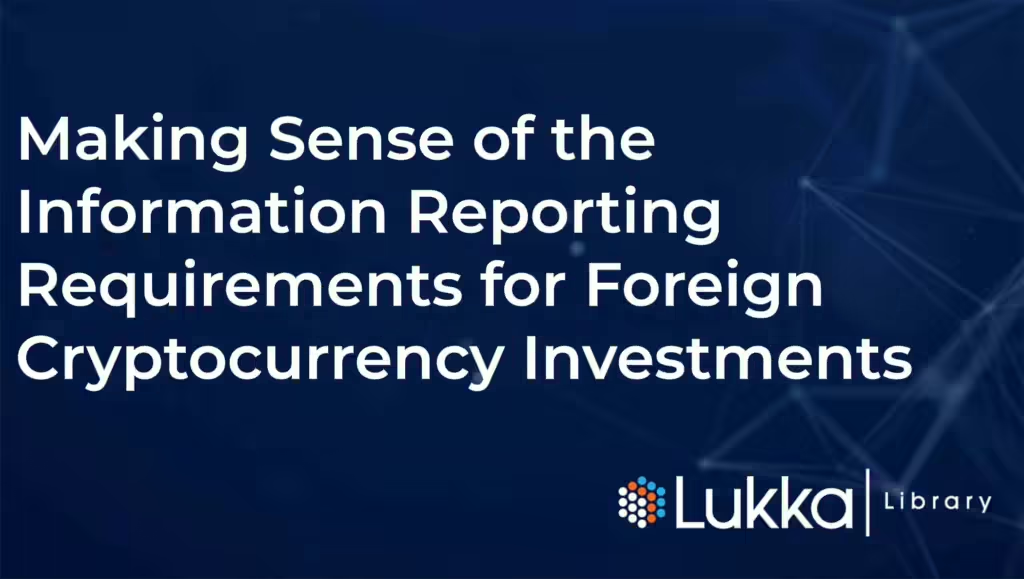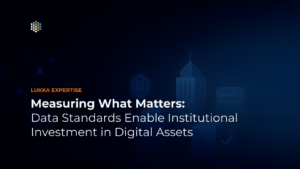Author: Lisa Zarlenga and Lauren Azebu, Steptoe
This article is presented for general information only and may not be relied upon as legal or tax advice. Interested persons should seek advice from legal counsel in applying the considerations discussed to their own situations.
I. Overview
A U.S. taxpayer with interests in foreign financial assets or accounts is subject to certain information reporting requirements. Certain U.S. taxpayers that have an interest in “specified foreign financial assets” must attach IRS Form 8938, Statement of Specified Foreign Assets (“Form 8938”), to their U.S. federal income tax return. A separate form, FinCEN Form 114, Report of Foreign Bank and Financial Accounts (“FBAR”), must be filed by certain U.S. persons that have an interest in foreign “financial accounts.”
Many cryptocurrency exchanges and other types of intermediaries, such as wallet providers and investment funds, are foreign, and thus the question arises as to whether cryptocurrency held in an account or a wallet at a foreign cryptocurrency intermediary is reportable on either Form 8938 or the FBAR (or both).
Existing guidance was not drafted with cryptocurrency in mind, and neither FinCEN nor the IRS has released any written guidance on whether cryptocurrency investments are subject to these reporting requirements. FinCEN has indicated informally, however, that the FBAR regulations do not currently define cryptocurrency held in an offshore account as a type of reportable account, but that FinCEN and the IRS continue to evaluate whether cryptocurrency should be incorporated into the FBAR reporting regime.1 The IRS has indicated that it believes the instructions for Form 8938 sufficiently explain the FATCA reporting requirements. However, those instructions do not mention cryptocurrency (or any other type of digital asset) nor do they explain how to interpret the relevant requirements in the context of cryptocurrency.2
Nonetheless, certain key terms related to reporting on Form 8938 and FBAR are broadly defined and could be interpreted to include cryptocurrency investments held at foreign intermediaries either presently or in future guidance. In any event, given the various forms that cryptocurrency investments can take, determining whether a particular cryptocurrency investment is reportable will require a fact-intensive analysis. A conservative approach would be to report such investments, because the penalties for failure to make the required disclosures on Form 8938 or FBAR are significant.3
II. Reporting “Specified Foreign Financial Assets” on Form 8938
Form 8938 generally must be filed by certain specified persons4that have an interest in “specified foreign financial assets” if the value of those assets is more than the applicable reporting threshold.5 A specified person has an interest in a specified foreign financial asset if any income, gains, losses, deductions, credits, gross proceeds, or distributions from holding or disposing of the asset are or would be required to be reported, included, or otherwise reflected on the person’s tax return.6
The reporting threshold varies depending on whether the specified person is living in the United States, whether the specified person is married, and whether the specified person files a joint income tax return. For married individuals living in the United States and filing a joint income tax return, the reporting threshold is met if the total value of the individuals’ specified foreign financial assets is more than $100,000 on the last day of the tax year or more than $150,000 at any time during the tax year.7
There is uncertainty as to whether a given cryptocurrency investment should be treated as a “specified foreign financial asset.” The term “specified foreign financial asset” is defined broadly and includes: (i) any “financial account” maintained by a foreign financial institution (“FFI”) as defined under the Foreign Account Tax Compliance Act (“FATCA”),8 and (ii) certain assets not held in an account—i.e., any interest in a foreign entity, any stock or security issued by a non-U.S. person, and any financial instrument or contract held for investment that has an issuer or counterparty that is a non-U.S. person.
A. Financial Account Maintained by FFI
With respect to the first category, an investor must consider both whether a cryptocurrency investment is held by an FFI, and whether a cryptocurrency investment is a “financial account.” The determination of whether an entity is an FFI is fact-intensive, and may depend in part on the local law of the jurisdiction in which an entity is organized. An FFI includes any non-U.S. entity that is (i) a depository institution that accepts deposits in the ordinary course of a banking or a similar business, (ii) a custodial institution that holds financial assets for the account of others as a substantial portion of its business, or (iii) an entity that invests, reinvests, or trades in financial assets.9
Whether or not a cryptocurrency intermediary is treated as an FFI depends on the entity’s activities, and there are many unanswered questions as to how these definitions apply in the cryptocurrency context (for example, it is unclear whether cryptocurrency is a “financial asset”). For a discussion of whether cryptocurrency intermediaries are FFIs, see “Are Cryptocurrency Exchanges and Other Intermediaries Subject to FATCA?” in the Lukka Library. If an entity is an FFI, it is required to register with the IRS under FATCA. The IRS maintains a publicly-available list of all registered FFIs. Investors can check this list to see whether a particular cryptocurrency intermediary has already registered as an FFI.
A “financial account” includes the following:
- Any depository account maintained by an FFI, which includes, for example, a commercial checking, savings, time, or thrift account, or any other instrument for placing money in the custody of an entity engaged in a banking or similar business for which such institution is obligated to give credit;10
- Any custodial account maintained by an FFI, which is an arrangement for holding a financial instrument, contract, or investment including, but not limited to, a share of stock in a corporation, a note, bond, debenture, or other evidence of indebtedness, a currency or commodity transaction, and any option or other derivative instrument for the benefit of another person;11
- Any equity or debt interest in an FFI (other than interests that are regularly traded on an established securities market).12
A cryptocurrency investment held in a foreign wallet or at a foreign exchange likely is not considered a depository account because the IRS treats cryptocurrency as property rather than money. However, if the exchange allows users to deposit fiat currency with the exchange and use such amounts to purchase cryptocurrency, it could potentially be treated as a depository account.
“Financial instrument, contract, or investment” as used in the definition of a custodial account is likely broad enough to include cryptocurrency investments either through reference to a commodity transaction or through the phrase “but not limited to,” which may provide the IRS sufficient flexibility to include cryptocurrency investments. For purposes of FATCA, commodities are defined by reference to section 475. A commodity includes, among other things, any commodity that is actively traded (within the meaning of section 1092(d)(1), which generally looks to whether there is an established market).13 It is possible that the IRS would conclude that cryptocurrency exchanges constitute an established market for this purpose and, thus, cryptocurrency is a commodity within the meaning of section 475.
The cryptocurrency investment must also be held in an “account” maintained by the FFI. Decentralized, or peer-to-peer exchanges, facilitate transfers of cryptocurrency directly between participants without the participation of a centralized third party. These exchanges arguably do not maintain accounts for the participants. Centralized cryptocurrency exchanges can provide custodial wallet services (also referred to as “hosted”), in which the wallet provider controls the private keys, or noncustodial wallets (also referred to as “unhosted”), in which the user stores the keys. Custodial wallets could be treated as accounts maintained by an FFI. Noncustodial wallets may be viewed as simply software or hardware provided to the user—the cryptocurrency is held directly by the user, and thus arguably should not be viewed as held in an account maintained by the FFI.
III. Non-Account Financial Assets
The second category could also be relevant to cryptocurrency investments, albeit in a narrower set of circumstances. For example, if an investor enters into a financial instrument or contract with a non-U.S. counterparty, the investment could fall into this category. Because a blockchain is decentralized, there generally is no counterparty with respect to cryptocurrency itself, even if it is held in a foreign wallet. However, derivatives and other financial contracts may be entered into where the underlying asset is cryptocurrency, such as a simple agreement for future tokens (“SAFT”), and this contract may be a specified foreign financial asset. In addition, tokens with equity characteristics—such as rights to vote and to receive distributions—might be characterized as an interest in a foreign entity for tax purposes and, as a result, treated as specified foreign financial assets.
IV. Reporting Foreign Financial Accounts on FBARs
The Form 8938 requirement does not replace or otherwise affect an investor’s obligation to file an FBAR, nor does the FBAR requirement replace or otherwise affect an investor’s obligation to file Form 8938. Unlike Form 8938, the FBAR is not filed with the IRS. Instead, it is filed directly with the office of Financial Crimes Enforcement Network (“FinCEN”), a bureau of the Department of the Treasury separate from the IRS.14
Each U.S. person (i.e., U.S. citizen, resident alien, trust, estate, and domestic entity) having a financial interest in,15 or signature or other authority over,16 a bank, securities, or other financial accounts in a foreign country is required to file an FBAR for each year if the aggregate value of all foreign financial accounts exceeds $10,000 at any time during the calendar year.17
Bank accounts, securities accounts, and other financial accounts are reportable on the FBAR.18 Each of these categories is broadly defined and could be interpreted to include certain cryptocurrency investments (although, as in the Form 8938 context, there is some uncertainty as to whether a wallet held on a foreign cryptocurrency exchange is an account). Nonetheless, FinCEN has informally taken the position that cryptocurrency investments are not currently reportable for FBAR purposes.19 This could change in the future, particularly in the absence of guidance clearly carving out an exception for cryptocurrency.
A. Bank Account
A bank account includes a savings deposit, demand deposit, checking, or any other account maintained with a person engaged in the “business of banking.”19 It is not clear how the “business of banking” is defined. The Fourth Circuit found that an organization functioned as a bank by holding funds for third parties and disbursing them at their direction.21 More recently, in 2016, the Ninth Circuit adopted a narrower definition of a “bank” and found that accounts maintained by online gambling entities were not subject to FBAR filing requirements, because the entities were not established “for the custody, loan, exchange, or issue of money, for the extension of credit, and for facilitating the transmission of funds.”22
FinCEN has taken the position that convertible virtual currency substitutes for currency and, thus, can make someone a “money transmitter.”23 Thus, it does not seem a leap to conclude that accounts holding convertible virtual currency are bank accounts for FBAR purposes. FinCEN’s treatment of cryptocurrency is in contrast to the IRS, which treats convertible virtual currency as property for tax purposes,24 the Commodity Futures Trading Commission (“CFTC”), which treats cryptocurrency as a commodity,25 and the Securities and Exchange Commission (“SEC”), which has taken the position that certain cryptocurrency investments are securities.26
In addition, some cryptocurrency exchanges allow users to deposit fiat currency with the exchange and use such amounts to purchase cryptocurrency, which could be viewed as a bank account.
B. Securities Account
A securities account includes any account with a person engaged in the business of buying, selling, holding, or trading stock or other securities.27 “Security” is defined for FBAR purposes by reference to the Securities Exchange Act of 1934.28 As mentioned, the SEC has indicated that certain cryptocurrency investments, such as early-stage utility tokens, are securities, although decentralized cryptocurrencies, such as bitcoin and ether, are not.29
Thus, cryptocurrency exchanges that trade in utility tokens could be treated as being engaged “in the business of buying, selling, holding, or trading stock or other securities.” If so, an account or wallet held at such an exchange could be reportable for FBAR purposes. It seems unlikely that cryptocurrencies such as bitcoin, ether, and litecoin would fall within the definition of security for FBAR purposes.
C. Other Financial Account
Under the FBAR rules, a “financial account” can also include:
- An account with a person that is in the business of accepting deposits as a financial agency;
- An account with a person that acts as a broker or dealer for futures or options transactions in any commodity or subject to the rules of a commodity exchange or association; or
- An account with a mutual fund or other investment fund.30
“Financial agency” is defined broadly to include a person acting for a person as a financial institution, bailee, depository trustee, or agent, or acting in a similar way related to money, credit, securities, gold, or a transaction in money, credit, securities, or gold.31 A financial institution includes a money transmitter,32 which FinCEN has defined to include persons dealing in convertible virtual currency.33 Thus, a cryptocurrency exchange could potentially meet this definition, depending on its activities.
A cryptocurrency exchange could also be treated as a “broker or dealer for futures or options transactions in any commodity.” For FBAR purposes, “commodity” is defined by reference to the Commodity Exchange Act,34 which adopts a broad definition of “commodity” and contains a catch-all phrase including “all other goods and articles” and “and all services, rights, and interests . . . in which contracts for future delivery are presently or in the future dealt in.”35 As discussed above, the CFTC has taken the position that cryptocurrency is a commodity under this definition.36
The rule regarding “other investment fund” is reserved.37 Thus, cryptocurrency investment funds currently are unlikely to be treated as financial accounts under this definition, but they could be in the future.
IV. Conclusion
Investors holding cryptocurrency investments in foreign exchanges, wallets, and investment funds may find their interests reportable on Form 8938 and/or the FBAR. For now, at least, FinCEN has said that cryptocurrency investments are not reportable on FBARs. This may change in the future, and investors should remain informed as FinCEN’s position on these issues continues to evolve.
However, the IRS has not made any similar statements regarding Form 8938. The definitions for reportable accounts are broadly defined and overlap significantly with those for FBAR reporting. Nonetheless, it is not clear that the IRS will take the same approach for Form 8938 that FinCEN has taken with respect to FBAR, as evidenced by the fact that the IRS has defined convertible virtual currency as property and FinCEN has defined it as a substitute for currency. Until the government provides some clarity, investors should work with their tax advisors to determine whether to treat particular cryptocurrency investments as specified foreign financial assets for purposes of Form 8938. A conservative approach would be to report such investments even in the absence of guidance.
1 U.S. Government Accountability Office, “Virtual Currencies – Additional Information Reporting and Clarified Guidance Could Improve Tax Compliance,” GAO-20-188 (“GAO Report”), February 2020, at pp. 31, 42.
2 Id. at 30.
3 Specifically, the penalty for failure to file a Form 8938 for a taxable year is $10,000, and an additional $10,000 for each 30 days of non-filing after IRS notice of a failure to disclose, for a potential maximum penalty of $50,000. I.R.C. § 6038D(d). The penalty for failure to file an FBAR is up to $10,000 if non-willful, and up to the greater of $100,000 or 50 percent of account balance if willful (these amounts are adjusted for inflation).
4 A specified person is either a specified individual or a specified domestic entity. Specified individuals are U.S. citizens, U.S. resident aliens, and certain non-resident aliens (i.e., those who elect to be treated as resident aliens for purposes of filing a joint income tax return, and bona fide residents of American Samoa or Puerto Rico). Treas. Reg. § 1.6038D-1(a)(1), (a)(2). Specified domestic entities include certain domestic trusts and closely-held domestic corporations and partnerships. Treas. Reg. § 1.6038D-6(a).
5 I.R.C. § 6038D.
6 Treas. Reg. § 1.6038D-2(b)(1).
7 Treas. Reg. § 1.6038D-2(a)(2). For individuals living abroad, the threshold is increased to $200,000 on the last day of the tax year or $300,000 at any time during the tax year ($400,000 and $600,000, respectively, for married individuals living abroad and filing a joint return). Treas. Reg. § 1.6038D-2(a)(3), (a)(4). Otherwise, the threshold is $50,000 on the last day of the tax year or $75,000 at any time during the tax year. Treas. Reg. § 1.6038D-2(a)(1).
8 “FATCA” is the common name used to refer to Internal Revenue Code sections 1471 through 1474, enacted in the Hiring Incentives to Restore Employment Act of 2010, Pub. L. No. 111-147 §§ 501-541 (2010).
9 Treas. Reg. § 1.1471-5(e)(1). Certain insurance companies, holding companies, and treasury centers are also FFIs. Id.
10 Treas. Reg. § 1.1471-5(b)(1)(i), (b)(3)(i)(A)(1).
11 Treas. Reg. § 1.1471-5(b)(1)(ii), (b)(3)(ii).
12 Treas. Reg. § 1.1471-5(b)(1)(iii).
13 See Treas. Reg. § 1.1092(d)-1.
14 FinCEN has delegated authority to the IRS to enforce the provisions of 31 U.S.C. § 5314 and 31 C.F.R. §§ 1010.350 and 1010.420. That authority includes the authority to: (i) assess and collect civil FBAR penalties; (ii) investigate possible civil violations of the FBAR provisions; (iii) employ the summons power granted under the law; (iv) issue administrative rulings; and (v) take any other action reasonably necessary for the enforcement of these and related provisions, including pursuit of injunctions. 31 C.F.R. §1010.810(g); I.R.M. § 4.26.16.2.2(4).
15 A person has a financial interest in an account if the person is the owner of record or the holder of legal title, or if the owner of record or holder of legal title is the person’s agent or representative. 31 C.F.R. § 1010.350(e).
16 A person has signature authority over an account if the person has the authority to control the disposition of the assets in the account by direct communication with the financial institution maintaining the account. 31 C.F.R. § 1010.350(f)(1).
17 31 CFR §§ 1010.350(a), (b), and 1010.306(c). An account that does not meet the $10,000 aggregate threshold may still be reportable on IRS Form 1040, Schedule B, Interest and Ordinary Dividends (“Schedule B”), which asks whether the taxpayer, at any time during the taxable year, had a “financial interest in or signature authority over a financial account (such as a bank account, securities account, or brokerage account) located in a foreign country.” The definitions in the instructions to Schedule B are generally consistent with the definitions with respect to FBAR reportable accounts in the Bank Secrecy Act and the related regulations.
18 31 C.F.R. § 1010.350(c).
19 See, e.g., GAO Report, supra note 1, at p. 31.
20 31 C.F.R. § 1010.350(c)(1).
21 See United States v. Clines, 958 F.2d 578 (4th Cir. 1992).
22 United States v. Hom, 118 AFTR 2016-5222 (9th Cir. 2016).
23 31 C.F.R. § 1010.100(ff)(5)(i)(A).
24 Notice 2014-21, 2014-16 I.R.B. 938, § 4 Q&A 1; IRS Frequently Asked Questions on Virtual Currency Transactions, Q&A 2.
25 See Testimony of CFTC Chairman Timothy Massad before the U.S. Senate Committee on Agriculture, Nutrition and Forestry (Dec. 10, 2014), at https://www.cftc.gov/PressRoom/SpeechesTestimony/opamassad-6. This position has been upheld by at least one federal court. See Commodity Futures Trading Comm’n v. McDonnell, No. 1:18-cv-00361 (E.D.N.Y. Mar. 6, 2018).
26 Specifically, the SEC has said that bitcoin and ether, in their present decentralized state, are not securities, but that certain tokens issued in initial coin offerings may be securities. See William Hinman, Digital Asset Transactions: When Howey Met Gary (Plastics), Remarks at the Yahoo Finance All Markets Summit: Crypto (June 14, 2018), at https://www.sec.gov/news/speech/speech-hinman-061418; see also SEC, Framework for “Investment Contract” Analysis of Digital Assets, at https://www.sec.gov/corpfin/framework-investment-contract-analysis-digital-assets.
27 31 C.F.R. § 1010.350(c)(2).
28 31 C.F.R. § 1010.100(ss).
29 See supra note 26.
30 31 C.F.R. § 1010.350(c)(3).
31 31 U.S.C. § 5312(a)(1).
32 31 C.F.R. § 1010.100(ff)(5).
33 31 C.F.R. § 1010.100(ff)(5)(i)(A). See FinCEN Guidance, Application of FinCEN’s Regulations to Persons Administering, Exchanging, or Using Virtual Currencies, FIN-2013-G001 (Mar. 18, 2013); see also FinCEN Guidance, Application of FinCEN’s Regulations to Certain Business Models Involving Convertible Virtual Currencies, FIN-2019- G001 (May 9, 2019).
34 31 C.F.R. § 1010.100(j).
35 7 U.S.C. § 1a(9).
36 See supra note 25.
37 31 C.F.R. § 1010.350(c)(3)(iv)(B).



